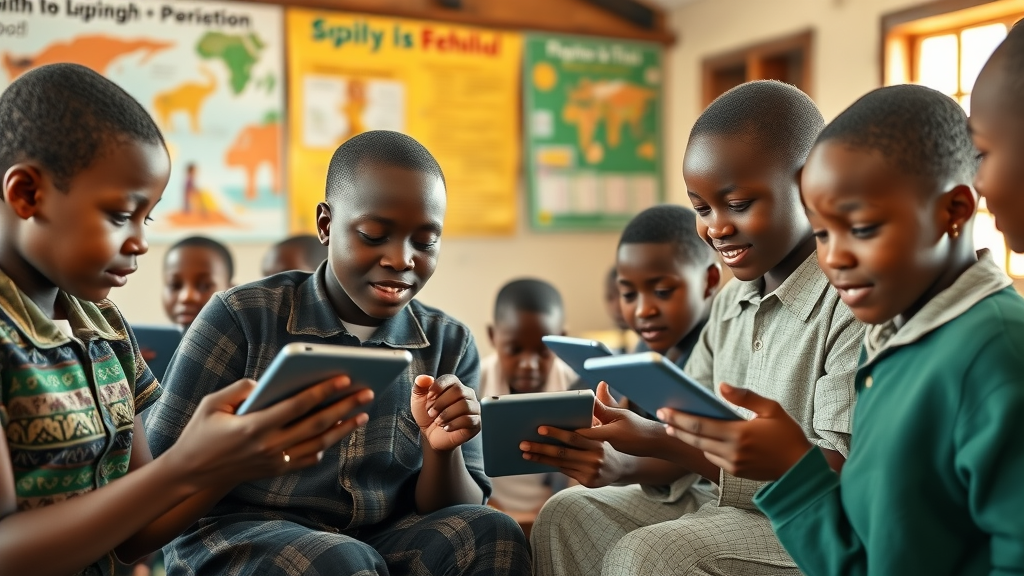Did you know that less than one in three rural African students currently have access to quality education? As the digital divide remains a pressing barrier, artificial intelligence (AI) emerges as a transformative solution, offering hope for millions. In this article, we explore how AI benefits for African students are shaping the continent’s educational future, driving equity, and empowering the next generation of learners. Whether you’re an educator, policymaker, student, or simply curious, read on to discover the paradigm shift unfolding across Africa’s classrooms.
Revealing the Impact: AI Benefits for African Students – A Paradigm Shift in Education
The integration of artificial intelligence into African education systems marks a significant turning point. Today, AI in education is not just a buzzword—it’s a game changer for both students and teachers. Across Africa, learners are increasingly exposed to adaptive learning platforms, intelligent tutoring systems, and digital classrooms that bridge access gaps and personalize education in unprecedented ways. This technological transformation is enabling African countries to address long-standing issues such as teacher shortages, language barriers, and a lack of educational materials.
Real-world examples from nations like South Africa and Kenya reveal that students and teachers are already benefiting from AI-driven innovations. These initiatives help make education more engaging, inclusive, and aligned with the unique needs of diverse communities. However, while the potential benefits are immense, successfully leveraging AI innovations demands thoughtful planning—particularly regarding infrastructure, teacher training, and responsible AI implementation—in order to ensure that no learner is left behind.
What You'll Discover in the Exploration of AI Benefits for African Students
- How artificial intelligence is changing education systems in Africa
- Potential benefits and real-world examples of AI in education
- The opportunities and challenges for students and teachers
- Responsible AI adoption in Africa’s unique context
AI Benefits for African Students: A Statistical Overview
| Statistic | Relevance to AI Benefits for African Students |
|---|---|
| Less than 1 in 3 rural African students have access to quality education | AI-enabled remote learning can bridge the access gap |
| 60% of African youth lack digital literacy skills | AI-driven platforms can customize digital learning journeys |

Understanding Artificial Intelligence and Its Role in Education in Africa
Artificial intelligence is rapidly transforming how knowledge is delivered and absorbed within African school systems. By harnessing AI, education systems are able to offer more effective, culturally relevant, and inclusive experiences—equipping students with vital AI skills and digital competencies for the global future. Whether it’s through automated assessments, customized learning paths, or tools that help students with visual impairment, AI is setting the stage for a leap in quality education across the continent.
African policy makers, including organizations like the African Union , are recognizing the role of AI in education systems as critical for achieving their goals. As digital education continues to gain traction, AI’s ability to adapt to different local languages, socio-economic contexts, and learning challenges is opening up opportunities previously unattainable for both students and teachers, particularly in under-resourced or rural areas.
Artificial Intelligence: Transforming Education Systems and Student Outcomes
AI innovations are addressing many of the long-standing challenges in education in Africa . For instance, AI-driven curriculum builders now recommend resources tailored to students’ unique needs and existing skills, empowering teachers to focus on guidance and mentorship. The adoption of AI competency frameworks within national education policies, such as the national AI efforts seen in various countries, is also fostering a new digital-savvy generation poised to excel in future careers.
Schools are also using AI-powered platforms to streamline administrative tasks, analyze data for improved policy-making, and deliver interactive content that makes learning engaging. As a result, student outcomes are improving, with enhanced pass rates and better engagement rates, especially where AI tools are used alongside traditional teaching methods. This transformative shift is setting the standard for quality education that is accessible to all across Africa.

AI in Education: Technology Empowering Students and Teachers Across Africa
AI in education empowers African students and teachers by democratizing access to world-class resources. For educators, AI-driven systems automate grading, provide analytics on student progress, and allow time for more meaningful interactions and support. For learners, AI creates a more interactive classroom experience—one where lessons adapt to different paces and styles, facilitating greater inclusivity and motivation.
Moreover, by integrating emerging technologies into curricula, students in even the most rural or remote regions become familiar with digital learning tools, gaining essential AI skills and improving computer literacy—an advantage that enhances employability and future-readiness. As education systems continue to evolve, the collaboration between governments, the private sector, and global south partnerships like GPE KIX will be instrumental in scaling up these successes continent-wide.
Potential Benefits: AI Innovations Shaping Quality Education for African Students
The rise of AI innovations in Africa is not just about technology—it’s about providing every child with the chance to receive a quality education, irrespective of location or background. One major advantage is AI’s ability to offer personalized learning. With adaptive algorithms, educational software evaluates a student’s strengths and weaknesses, then tailors lessons to fit individual learning styles and needs, including those due to visual impairment or language barriers.
Through AI competency frameworks and targeted solutions, AI can also improve inclusivity by making materials available in several languages or formats, such as sign language or audio descriptions. Platforms that perform automatic machine translation bring instruction to life for students previously excluded by language limitations. As a result, AI fundamentally supports Africa’s vision for equitable, sustainable, and high-impact education reform.
How AI Supports Individual Learning Styles in Africa’s Education System
- Adaptive learning tools and personalized feedback
- Bridging language gaps and improving inclusivity
"AI can help bridge the educational divide in Africa by delivering tailored content to students in their native languages." – Dr. Nkemdilim Uwaje Begho

AI in Education: Case Studies and GPE KIX Insights from African Classrooms
Across Africa, pilot projects and research initiated by organizations such as GPE KIX (Global Partnership for Education Knowledge and Innovation Exchange) demonstrate the potential benefits of AI in classrooms. These initiatives nurture knowledge exchange , empower local educators, and build evidence on how AI in education can overcome systemic barriers.
From Ghana to Rwanda and South Africa, local governments and education ministries partner with technology providers to implement and evaluate AI-driven tools. Their findings reveal that targeted support, aligned with a national AI strategy, can elevate teacher performance and student engagement—fueling scalable transformation for Africa’s education system.
GPE KIX and Other Initiatives Fueling Responsible AI Use
GPE KIX and similar organizations prioritize responsible and ethical AI integration across the continent. By funding teacher training, digital toolkit rollouts, and ongoing research, these initiatives help shape the continent’s approach to AI, supporting both teachers and students in building the skills needed for future success. These knowledge networks ensure that local contexts and unique challenges are addressed, rather than a one-size-fits-all approach.
Success stories from the Global South illustrate how responsible AI use, supported by knowledge-sharing sessions and tailored training, nurtures sustainable growth. These partnerships serve as blueprints for other African countries seeking to implement AI ethically in education, emphasizing skill development, inclusion, and cultural relevance.
Lessons from AI-Driven Pilot Projects in African School Systems
Pilot projects have underscored the necessity of inclusive design, ongoing teacher support, and infrastructure development. For example, in KIX Africa projects, teachers gain hands-on experience with AI tools —from automated translation software to adaptive testing platforms—enabling them to address students’ unique needs. Analysis of pilot outcomes highlights increased student motivation, improved learning outcomes, and higher digital literacy rates.
These early results underscore that AI, when coupled with a robust support network and authentic community stakeholder engagement, can deliver lasting change—transforming schools into hubs of quality education and innovation.
Responsible AI: Opportunities and Ethical Considerations for Education in Africa
With rapid growth in the adoption of artificial intelligence , Africa faces a critical challenge: ensuring that responsible AI practices become the norm. Addressing equity issues, data privacy, and avoiding algorithmic bias are essential components of any AI-powered education system. Fostering responsible AI not only safeguards students and teachers but also preserves trust and promotes digital inclusion across the continent.
Leading organizations and experts recommend clear AI competency frameworks and robust oversight to drive meaningful, ethical deployment of these technologies. The continent’s unique context demands careful evaluation—what works in one country may not apply elsewhere. Yet, the promise of AI in Africa, as highlighted by research and UNESCO, ultimately lies in equitable implementation backed by thoughtful investment.
Promoting Responsible AI to Support Equity in Education Systems
- Ensuring fair access for all students and teachers
- Maintaining data privacy and combating algorithmic bias
"The promise of artificial intelligence in Africa lies in its responsible and equitable implementation." – UNESCO Policy Brief
Meeting the Needs of Students and Teachers: Overcoming Barriers to AI Benefits for African Students
While AI benefits for African students are clear, major challenges must be overcome to ensure full adoption and sustainability. Limitations in infrastructure—such as unstable electricity, intermittent internet connectivity, and outdated devices—can hinder the widespread use of AI in rural and low-income communities. Schools and governments must prioritize investment in basic technology and create partnerships to extend these resources equitably.
Training and support for educators is another critical piece of the puzzle. Teachers often need more than just access to digital tools: capacity building, ongoing mentorship, and inclusion in decision-making are essential. By addressing both hardware and human resource needs, African countries can lay a strong foundation for the success of AI innovations in education systems.
Addressing Infrastructure and Training Gaps in Education Systems
Closing the digital divide requires a focus on robust digital infrastructure and targeted training for both students and teachers. Initiatives like KIX Africa, regional workshops, and collaboration with the private sector are facilitating the rollout of smart devices, interactive whiteboards, and reliable internet. These efforts are beginning to tip the balance, making digital education a reality in places it was once impractical.
Simultaneously, integrating AI skills into teacher professional development ensures long-term sustainability. Developing an AI competency framework for teachers equips them with practical knowledge for leveraging AI in lesson planning, student assessment, and classroom management. As educators become confident with these new technologies, they drive innovation and inspire students to engage with 21st-century learning opportunities.

Investing in Digital Literacy and Teacher Professional Development
For AI in education to succeed, African education systems must prioritize digital literacy for all stakeholders. Governments, in collaboration with development organizations, are rolling out competency frameworks that integrate AI into national curriculums—preparing students for the future workforce and empowering teachers with new pedagogical approaches.
Continuous teacher training, on-the-job support, and peer-to-peer learning networks foster an ecosystem where knowledge exchange flourishes. This culture of innovation and digital readiness enables both educators and learners to take full advantage of AI-driven platforms, transforming challenges into opportunities for growth and progress.
The Future of AI Innovations in African Education Systems
The next chapter of AI innovations promises to extend far beyond the academic sphere, impacting social and economic realities across Africa. By equipping young people with digital and entrepreneurial skills, AI is set to drive job creation, spark business ideas, and reduce socio-economic disparities. National AI strategies, adopted by leading African countries, are already shaping the continent’s digital trajectory—incorporating AI at every layer of the education system .
Strategic investments and public-private partnerships will be essential in scaling these innovations, ensuring that benefits reach even the most marginalized communities. By embracing AI responsibly, African countries can spark a profound movement toward inclusive economic prosperity and societal well-being.
AI Benefits for African Students Beyond Academics — Social and Economic Impact
- Supporting employability and entrepreneurship
- Reducing inequality through quality education initiatives

People Also Ask: Exploring Common Questions about AI Benefits for African Students
How does AI benefit students?
AI benefits students by personalizing learning, providing instant feedback, streamlining administrative tasks, and exposing learners to new technologies, especially in under-resourced areas like many parts of Africa.
How can AI help minorities?
AI can empower minorities by delivering inclusive content, closing language barriers, tailoring instruction to cultural contexts, and identifying ways to overcome educational inequalities.
What is the African AI strategy?
The African AI strategy focuses on leveraging artificial intelligence to foster economic growth, improve education systems, ensure data sovereignty, and develop local AI talent for sustainable digital transformation across the continent.
What are 5 advantages of AI?
1. Personalized learning experiences 2. Improved access to quality education 3. Automation of administrative tasks for students and teachers 4. Enhanced language translation and accessibility 5. Data-driven insights for better policy-making

Key Takeaways: Accelerating Education in Africa with Artificial Intelligence
- AI can make education more accessible and equitable for students in Africa.
- Responsible AI implementation supports student-centered learning and teaching.
- Strategic partnerships and investments are crucial for maximizing AI benefits for African students.
- Continued focus on infrastructure, digital literacy, and ethical standards is vital.
Frequently Asked Questions on AI Benefits for African Students
How can educators prepare for AI integration in African schools?
Educators can seek professional development on AI tools, participate in pilot projects, and collaborate with policymakers and technology providers.
Can AI address language diversity in Africa?
AI-driven language processing tools can support mother-tongue education and translation, bridging language barriers for millions of African students.
AI Benefits for African Students: Creating Opportunity and Driving Inclusive Growth
Harnessing the full potential of AI benefits for African students is not just a technical challenge but an opportunity fueled by vision, commitment, and collaboration. Now is the time to invest in responsible AI for education in Africa to secure a brighter, more equitable future for all learners.
 Add Row
Add Row  Add
Add 



Write A Comment